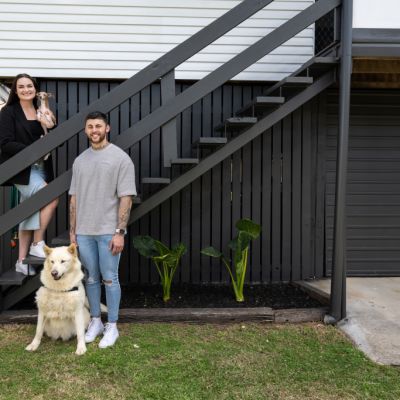How much you need from the bank of mum and dad to buy a home in your Melbourne suburb
A home buyer on the average income would need to ask the bank of mum and dad for a $400,000 gift to be able to afford the typical Melbourne house, even after securing a loan and saving a standard deposit.
Analysis by CoreLogic and Canstar shows there were just two suburbs where an average income earner could afford to buy the median house without extra cash to top up their loan: Melton and Melton South.
CoreLogic head of Australian research Eliza Owen said the modelling suggested that getting help from parents was all but a requirement to buy property in most parts of Melbourne, particularly in the most desirable suburbs.
“If you look at the house market in Melbourne, only 0.5 per cent of the market is accessible for a single average earner,” she said. “For a dual, high-income household, 82 per cent of the market is accessible.
“Those figures strongly suggest a high level of inequality in access to the housing market, which is a problem.”
House prices have soared over the long term and high interest rates have slashed borrowing capacities, which has meant buyers on average incomes could max out their borrowing capacity after saving a deposit and still find the median property out of reach. Experts say those with access to intergenerational wealth, also known as the bank of mum and dad, have been able to top up their loans with cash gifts. But it’s little comfort for those without.
Grattan Institute associate Matt Bowes said years of runaway house prices had created a situation where first home buyers and their parents felt they had little choice but to make homeownership a joint venture.
“We have really high house prices and people are taking a long time to reach the level of income to buy the average house, and it takes up a really long time to save up a deposit,” he said. “If they have to wait effectively until their parents die for the wealth to flow down to them, they will be waiting a very long time.”
Canstar data insights director Sally Tindall said high interest rates had increased the need to access generational wealth by widening the gap between house prices and borrowing capacities.
“Tapping into the bank of mum and dad has been an increasingly popular workaround in a climate of higher interest rates. However, that’s cold comfort for anyone whose family isn’t in a position to help financially.”
The modelling assumes an average annual gross income of $100,017, based on ABS average weekly earnings data. It then estimates borrowing capacity from Canstar research, and compares it to median home values for each suburb, based on CoreLogic data.
The shortfall for a single average-income earner who wanted to buy Melbourne’s median house ($929,715) was $405,965. For units ($610,652), the gap was $86,902. However, the modelling found a couple where both earned the average income would be able to buy the median house with $270,285 left over.
A couple on average incomes would still be short in several high sales volume suburbs. Buyers would need a gift of about $460,000 to purchase a house in Mount Waverley, about $230,000 for Bentleigh East, $367,000 for Doncaster East, $250,000 in Richmond, $71,000 for Brunswick or $442,000 for Northcote.
Homeowner Amy Frost had help from her parents to buy her first home, a unit, and she said it wouldn’t have been possible without it. She saved a deposit and was ready to purchase, but a last-minute issue with the property locked her into a more expensive loan. Frost bought in 2021.

“The buffer I had to begin with was lost, and I had to go to my parents for some money,” she said. “I was like, shit, I have to find $20,000 out of nowhere when I’d already stretched myself for my deposit.
“Not everyone is in the same position as me, not everyone can ask their parents, so I’m really grateful.”
Frost said most people she knew had or would get help to buy from their parents.
“I think most people are understanding of how hard it is,” she said. “If they can help their kids get into the market, a $1000 cash gift or $10,000 … it’s just helping them get in.
“Once you’re in you’re in, so it’s not as much of a hurdle when you want to move up the ladder.”
Axton Finance director Clinton Waters said the majority of clients coming through his brokerage had help from their parents.
“Anecdotally, I’d say it’s eight out of 10 deals. It can be a combination of things, a different level of involvement according to the scenario,” he said. “It’s very rare that you’d see a client who didn’t get some sort of hand up to get them into the property market.”

We recommend
We thought you might like
States
Capital Cities
Capital Cities - Rentals
Popular Areas
Allhomes
More
- © 2025, CoStar Group Inc.










